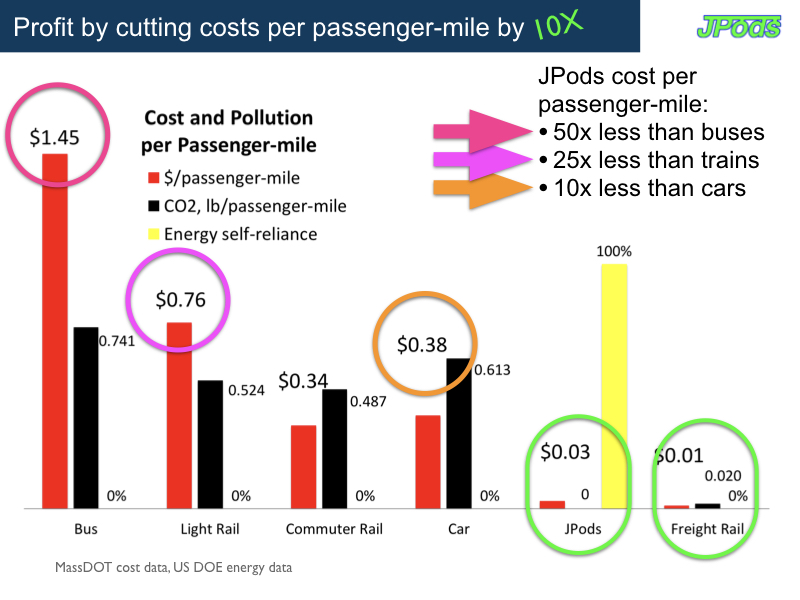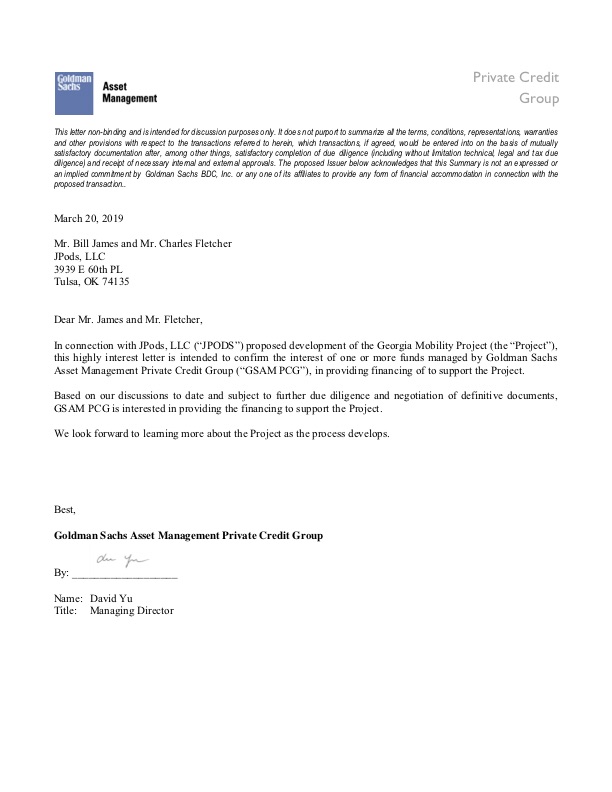Capital is investing in digitizing mobility:
- Morgan Stanley: Why Waymo Is Worth A Staggering $175 Billion Even Before Launching Its Self-Driving Cars
- McKinsey and Company: ‘A physical version of the Internet’: How Hyperloop could be the broadband of transportation
- $28 billion was invested in mobility startups in 2017
- 40x ROI on Kiva’s $775 sale to Amazon
- Mar 5, 2020: Valued at $30bn, Waymo considers its next move "outside investors lined up this week to pour $2.25bn into Waymo"
Who pays for Building the JPods Network
JPods LLC and the Georgia Mobility Company LLC pay to build our solar-powered mobility networks.
- We are investors, not vendors.
- We are taxpayers. We pay 5% of our gross revenues to use the public Rights of Way.
- We are investing Georgia to provide solar-powered mobility networks that combine:
- JPods Networks are 10 time to 50 times less expensive per passenger-mile that cars and buses.

Capital Flow:
Because of a century of centrally plan infrastructure, it surprise Americans to think that infrastructure should be privately funded. But building of the Internet and Transcontinental Railroads provide case studies in why infrastructure should be privately funded.
The book Great by Choice, Uncertainty, Chaos, and Luck - Why Some Thrive Depite Them All explains the processes required:
- "20-mile marching", incremental, steady, disciplined, step by step efforts.
- "Fire bullets, then cannon balls", tinkering by starting small and iterating relentlessly.
The book Nothing Like It in the World, is a case study on how private capital funded building the railroads. The following graphic illustrates three types of capital are used by two different types of companies:
- Local Mobility Companies® (LMCs) mission is to own and operate the JPods networks to meet local needs. LMCs have two tasks:
- Gain Rights of Way access (Solar Mobility Act and/or Franchise Contract with 5X5% Performance Standard)
- Profit by serving the fare box payers with greater value than the cost to compete.
- Master Mobility Companies® (MMCs) construct the networks defined by the LMCs. MMCs operate with very focused requirements:
- Repay construction captial every 12 months by selling completed networks to LMCs to operate.
- From survey to certification of rail should take no more than 9 months once the manufacturing base is ramped to scale.
- Complete 3 to 10 miles of networks per day per crew, matching the pace the Transcontinental Railroads were built in the 1860s.
Repeat the success of communications in power and transportation shift to standards-based regulations. Remove regulatory delays .
5X5 Standard:
The 5X5 Standard provides a simple and effective way to create a stable regulatory environment so $billions will be invested in sustainable infrastructure.
- This standard applies to Networks 5 times more efficient than existing transport modes in a Right of Way.
- Construction of the Networks must be privately funded.
- Networks must operate without government subsidies.
- Networks pay 5% of gross revenues for non-exclusive use of Rights of Way, or what existing laws require of other infrastructure networks using public Rights of Ways.
- Aboveground Networks must gather at least 2 megawatt-hours of renewable energy per typical mile per typical day.
- In collaboration with the State government, a Web-based Document System (WDS) will be provided with secure access to all jurisdictions. Each Network Plan will be posted to the WDS. Plans not rejected in writing within 14 days are approved.
- The objective of this provision is to protect the interests of communities, remove bureaucratic delays, and remove problems coordinating with multiple agencies.
- This only applies to Networks 5 times more efficient than existing networks.
- Networks are regulated for safety by existing theme park regulations (typically ASTM F24).
- This provides a 50,000-times better standard than Federal DOT:
- 0.2 injuries per million using ASTM F24
- 11,200 injuries per million using Federal DOT regulations.
- This provides a 50,000-times better standard than Federal DOT:
Private capital has stated an interest to invest based on this 5X5 Standard.
Rule of Law
- The Constitution is the primary Rule of Law in America.
- The Constitution Divided Sovereignty in the Preamble, as restated in Amendments 9 and 10:
- People retain all liberties not enumerated as sacrificed in written Constitutions.
- The federal government has unlimited taxing powers for the limited sovereignty of waging war and suppressing behaviors that build paths to war.
- The state governments are sovereign over issues of crimes, civil disputes, and other areas specifically enumerated in their constitutions.
Background:
Boston Tea Party resulted in the "post Roads" restriction in the Constitution. It forbids the mixing of Federal taxing for war-powers with taxing for commercial interests, "internal improvements."
Federalist #45, Madison: "The powers delegated by the proposed Constitution to the federal government are few and defined. Those which are to remain in the State governments are numerous and indefinite. The former will be exercised principally on external objects, as war, peace, negotiation, and foreign commerce; with which last the power of taxation will, for the most part, be connected. The powers reserved to the several States will extend to all the objects which, in the ordinary course of affairs, concern the lives, liberties, and properties of the people, and the internal order, improvement, and prosperity of the State."
- Since the 16th, 17th, and 18th Amendments and The Federal-Aid Highway Act of 1916, politicians mixed war-making with their commercial interests resulting in Civilization Killers of:
- Resource depletion - US Peak Oil was in 1970. Life requires energy. Less affordable oil, less life (Energy Economics).
- Eight Presidents issuing unanswered calls to action to end foreign oil addiction. The week of May 17, 2919, the Federal government:
- Mortgaged Posterity at $432 million/day.
- To import 7.2 million barrels the week.
- There is a great deal of misinformation in the US today about being "energy independent."
- $22 trillion in Federal debt, rising in tandem with oil imports.
- Perpetual oil-wars since 1991.
- Terrorist attacks funded by oil-dollars.
- Climate Change
- $1.7 trillion/year in traffic costs.
- Enforcing the Constitution provides the path to creating millions of jobs converting traffic costs into value and preempting Civilization Killers. Restoring the Rule of Law in transportation today will repeat the benefits of restoring the Rule of Law in communications in 1982:
Federalist #62, Madison: "What prudent merchant will hazard his fortunes in any new branch of commerce when he knows not but that his plans may be rendered unlawful before they can be executed? What farmer or manufacturer will lay himself out for the encouragement given to any particular cultivation or establishment, when he can have no assurance that his preparatory labors and advances will not render him a victim to an inconstant government? In a word, no great improvement or laudable enterprise can go forward which requires the auspices of a steady system of national policy."
